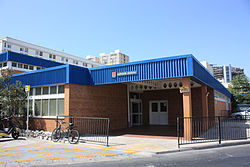This article needs to be updated.(April 2023) |
 | |
| Department of Education and Training | |
|---|---|
Director of Education and Training | Jaqueline Mason |
| General details | |
| Primary languages | English |
| System type | National |
| Literacy (2005–06) | |
| Total | 80+ |
| Attainment | |
| Post-secondary diploma | 23% |

Education in Gibraltar generally follows the English system operating within a three tier system. Schools in Gibraltar follow the Key Stage system which teaches the National Curriculum.
